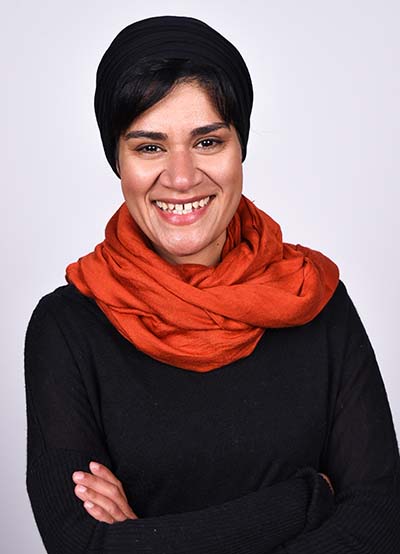Introducing..... Sahar El Aidy

Sahar El Aidy is one of the new members of the Young Academy Groningen (YAG). She hopes to be an example for students from minority cultures, wants to bridge the gap between fundamental and applied research, and will put gut bacteria on the map.
Why did you apply for YAG?
As a female, non-western, academic member, I applied for YAG to add to its diversity activity. I believe that the interdisciplinarity of my research will help me contribute to themes in and outside my own field, and my science domain makes me well situated to convey the importance of basic research to the general public and policy makers.
What do you want to achieve by joining YAG?
By joining YAG, I strive to demonstrate students from ethnic minorities that they can also be successful in science. Through YAG, I aim to narrow down the gap between basic and applied research to influence food industry, which is rapidly growing in the Netherlands. I also aim to explain to the policy makers and the general public how and why basic science matters.
What is your research about?
My research is about the microbial factories we have in our bodies, what they produce, and how the products affect our health, with the focus on the gut and brain. Billions of bacteria live in our intestines, where they help in digesting our food and produce various compounds that are essential for our body. We need our gut bacteria to stay healthy, and a dysregulation of the bacteria leads to disease . Even our mood and behavior are affected by these gut bacteria. In fact, the microbiota-gut-brain trialogue is the core of several disorders; inflammatory bowel disorders, obesity, depression, and neurodegenerative diseases, which are rapidly increasing in the western society. Bacteria in our gut not only degrade food but can also degrade drugs and this is still almost completely ignored in the field. This is another line of research we focus on. In fact, my group recently discovered that gut microbiota can be a threat for the effectiveness of medication for Parkinson’s patients and this can likely be circumvented by dietary interventions that change our gut microbes.
You wrote “Let your food be your medicine”. What do you mean by that?
As I mentioned above, one key regulator of the microbiota-gut-brain trialogue is food, which has recently been a topic of interest among the general public for disease prevention. Our gut bacteria continuously process what we ingest and convert it into compounds that are either beneficial or detrimental to our bodies and mental health depending on the type of food we eat. In fact, there is an increased awareness of the importance of lifestyle, including nutrition for disease prevention and management where nutritional strategies are applied to stabilize or even ‘reverse’ the disease process itself as an alternative of therapeutics.
You have worked in industry as well. How does that benefit you as a researcher?
Indeed, I worked as an associate scientist at the Nestle Research Center, Lausanne, Switzerland for a short period. There, I realized the gap existing between basic and applied research and how important it is to narrow this gap in order to influence food industry in a way that allows for the application of live bacterial biotherapeutics as an alternative to traditional pharmaceuticals.
YAG is involved very much in public outreach. How would you try to present your research to a broad audience?
I plan to organize a workshop, especially for school students, to raise their awareness of how the food they eat can influence their gut bacteria, thus preventing disease. During the workshop, participants will have the chance to have their gut bacteria analyzed and compared to a database of gut bacterial composition generated from stool samples collected from 100s of healthy and diseased participants.
| Last modified: | 30 April 2020 3.42 p.m. |
More news
-
29 April 2024
Tactile sensors
Every two weeks, UG Makers puts the spotlight on a researcher who has created something tangible, ranging from homemade measuring equipment for academic research to small or larger products that can change our daily lives. That is how UG...
-
29 April 2024
Behind the scenes: how UG and Hanze UAS students are jointly developing a Mars rover
This year the students of the Makercie team are participating in the physical edition of the European Rover Challenge in Poland. Read more about the team and the collaboration between the RUG and Hanze UAS here.
-
23 April 2024
Nine MSCA Doctoral Network grants for FSE researchers
Nine researchers of the Faculty of Science and Engineering have received a Horizon Europe Marie Sklodowska Curie Doctoral Network grant.
